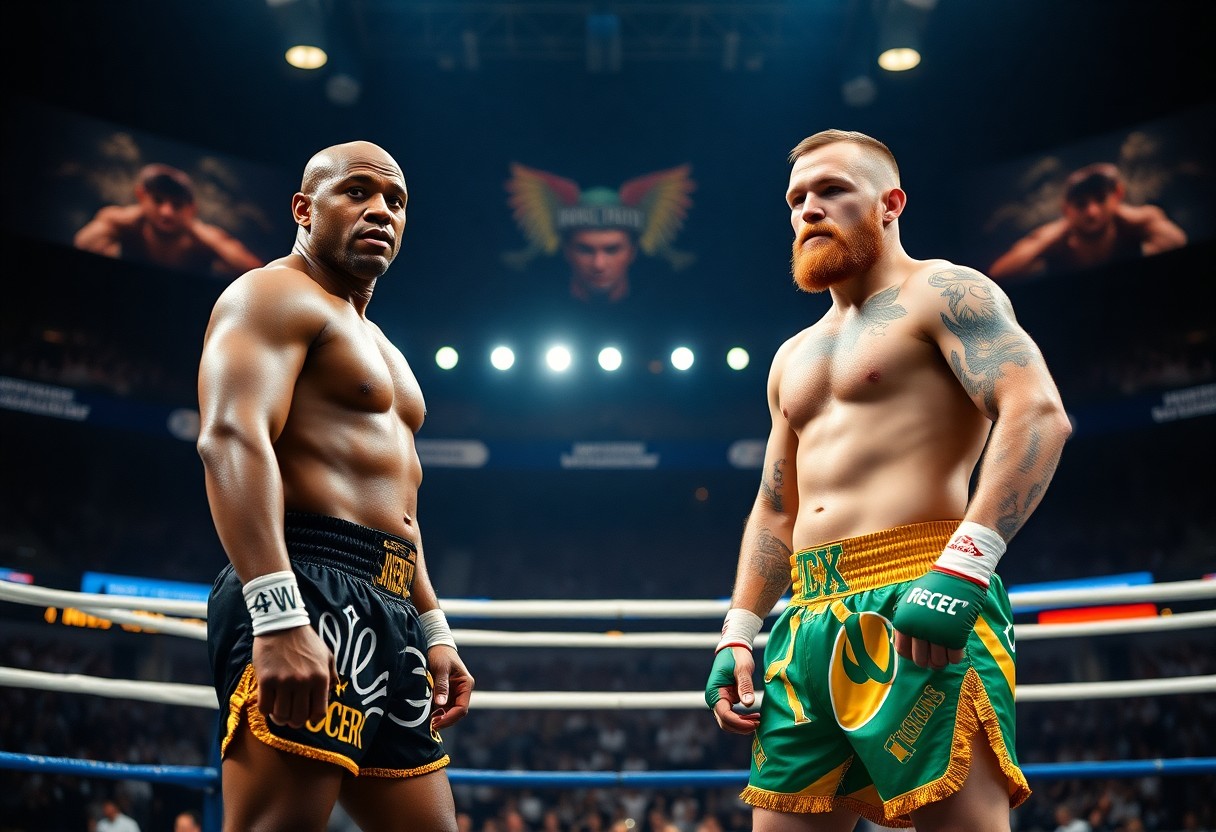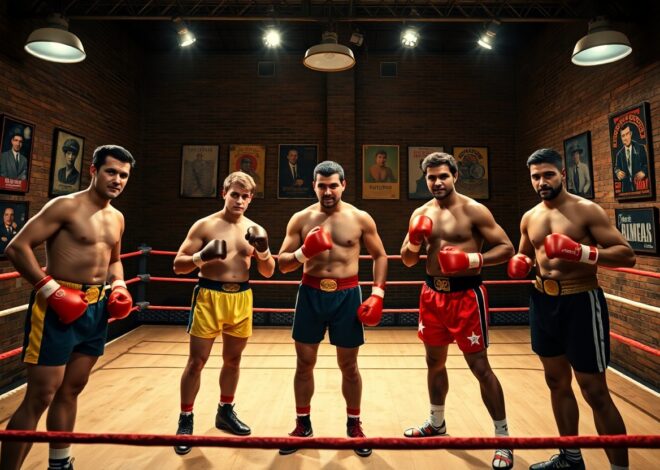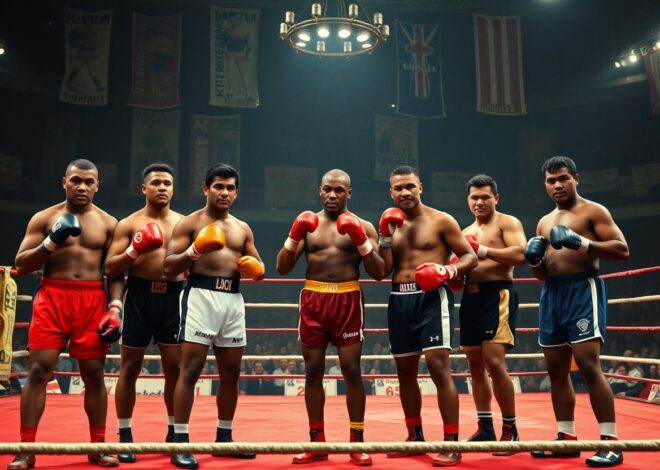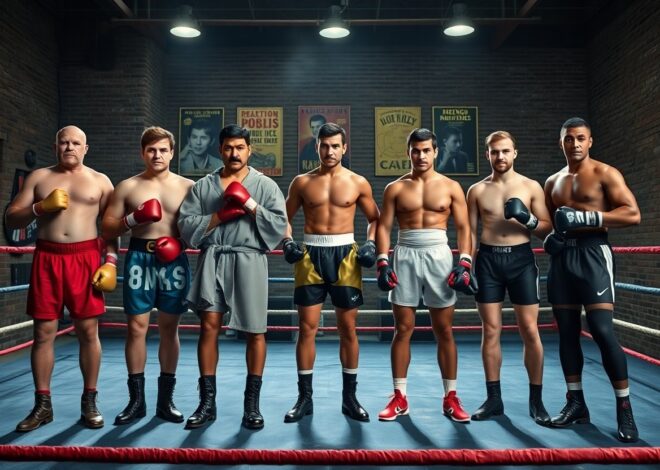
The Mental Game: Comparing The Confidence And Mindset Of Floyd Mayweather And Conor McGregor
Confidence is a hallmark of both Floyd Mayweather and Conor McGregor, shaping their illustrious careers in professional boxing and mixed martial arts. Each athlete’s unique mental approach reveals how belief in oneself can drive performance under pressure. Mayweather’s style emphasizes tactical precision and unmatched discipline, while McGregor’s persona exudes charismatic bravado, often unsettling his opponents. By examining their contrasting mindsets, we gain valuable insight into the psychological factors that contribute to success in high-stakes combat sports.
The Foundation of Confidence
Early Life and Influences
Floyd Mayweather and Conor McGregor’s confidence roots trace back to their formative years. Mayweather grew up in a boxing family, surrounded by champions, which instilled a profound sense of self-belief and dominance from an early age. In contrast, McGregor’s humble beginnings in Crumlin, Dublin, shaped his relentless ambition, motivating him to pursue greatness amid adversity. These distinct backgrounds laid the groundwork for their unique mental frameworks and resilience in the ring.
Training Regimens and Psychological Conditioning
Consistency defines the training regimens of both fighters, emphasizing physical and mental preparedness. Mayweather’s rigorous routines include long hours of bag work, sparring, and focused drills, all while maintaining a strict diet. McGregor’s approach blends traditional boxing with elements of mixed martial arts, prioritizing explosive strength and flexibility. Both athletes engage in extensive psychological conditioning, utilizing visualization techniques and mindfulness to reinforce confidence.
Both fighters employ targeted psychological strategies during training, enhancing their mental toughness. Mayweather practices extensive visualization, imagining fights and scenarios to prepare for any challenge, while McGregor’s affirmations and self-talk build a powerful self-image. Their approaches manifest in the way they handle pressure during bouts. For instance, Mayweather’s calm demeanor in high-stakes moments showcases his cultivated confidence, whereas McGregor’s charisma and boldness often intimidate opponents before the fight even begins. Each fighter’s regimen reflects their innate mindset, underscoring the interplay between preparation and psychological strength.
The Role of Mindset in Their Success
Mindset serves as a pivotal element in the triumphs of both Floyd Mayweather and Conor McGregor. Their unique mental approaches have shaped their performance, influencing not just their fighting tactics but also their entire professional careers. Mayweather’s strategic outlook and emotional control have propelled him through high-pressure situations, while McGregor’s aggressive self-belief energizes his competitive spirit and allows him to thrive under scrutiny.
Floyd Mayweather’s Mental Resilience
Floyd Mayweather exemplifies mental resilience, demonstrating an ability to maintain composure during adversity. His undefeated record of 50-0 showcases not just physical skill but a steadfast mindset that enables him to navigate challenges without losing focus. Mayweather’s training regimen incorporates mental exercises that enhance his situational awareness and psychological fortitude, allowing him to adapt on the fly in the ring.
Conor McGregor’s Aggressive Self-Belief
Driven by an aggressive self-belief, Conor McGregor approaches each fight with unparalleled confidence, often belittling opponents before the match even begins. This mental frame not only intimidates adversaries but also galvanizes McGregor himself, fueling his performance. His self-assuredness is evident in his brash statements and pre-fight antics, effectively transforming doubt into motivation, making him a formidable competitor in the octagon.
McGregor’s aggressive self-belief is built on a foundation of meticulous preparation and a relentless pursuit of excellence. His mantra of visualizing victory enables him to perform under immense pressure. The psychological tactics he employs—such as engaging in mind games with opponents—serve to tip the scales in his favor before the bout even starts, as seen in his fights against José Aldo and Eddie Alvarez, where his confidence was a significant factor in securing rapid victories. This mental approach reflects not only a belief in his own abilities but also an understanding of the psychological aspects of combat sports.
Comparing Their Mental Strategies
| Floyd Mayweather | Conor McGregor |
|---|---|
| Focuses on extensive pre-fight visualization, envisioning success in various scenarios. | Utilizes self-talk and affirmations to boost confidence leading up to the fight. |
| Maintains a distraction-free environment during training to enhance focus. | Embraces media interactions to build hype and psychological edge over opponents. |
| Relies on disciplined routines as a method of staying centered and composed. | Applies flexibility in strategy to exploit any openings during the fight. |
Pre-fight Mental Preparation
Mayweather invests heavily in pre-fight mental strategies, employing techniques like visualization and routine. His ability to mentally rehearse scenarios allows him to anticipate his opponent’s moves, creating a psychological advantage. In contrast, McGregor’s preparation often involves energizing self-talk and public persona projection to boost his confidence, projecting an image of invincibility that intimidates opponents. This blend of preparation tactics sets the stage for their contrasting approaches to the fight.
In-fight Adaptability and Focus
During bouts, Mayweather exhibits exceptional adaptability and focus, adjusting his strategies based on real-time observations. His defensive prowess allows him to manage pressure effectively, responding quickly to opponents’ tactics while maintaining composure. McGregor, renowned for his striking accuracy, leverages mental agility to switch tactics mid-fight, creating openings for his powerful shots. This mental flexibility combined with laser-sharp focus defines their distinctive fighting styles.
Floyd Mayweather’s adaptability in the ring is evidenced in his fights against opponents like Oscar De La Hoya and Manny Pacquiao, where he adjusted his defensive techniques to counter their strengths. In contrast, McGregor showcased an ability to shift from aggressive striking to tactical countering in his bouts against José Aldo and Eddie Alvarez, demonstrating his awareness of the evolving dynamics of fight scenarios. Both fighters capitalize on their mental strategies, directly impacting their performance during high-pressure moments.
The Impact of Public Persona
The public persona of both fighters significantly shapes their confidence and mindset, influencing not only their self-perception but also how their opponents view them. Floyd Mayweather’s disciplined approach to branding creates an aura of invincibility, while Conor McGregor leverages his charisma to charm audiences and instill doubt in his challengers.
Mayweather’s Controlled Image
Floyd Mayweather meticulously curates his public image, portraying himself as an elite athlete and unbeatable champion. His focus on discipline, luxury, and success reinforces a narrative that enhances his confidence. By promoting his “Money” persona and maintaining a lifestyle of extravagance, he instills a sense of fear in opponents, making them wary before stepping into the ring.
McGregor’s Charismatic Demeanor
Conor McGregor’s charm and wit have redefined the expectations of a fighter’s persona. His confident speeches and bold declarations create a compelling narrative that draws fans in and pressures opponents. By fusing entertainment with fighting, McGregor elevates his matches to an event, often leaving rivals rattled and uncertain.
McGregor’s magnetic presence resonates through his ability to connect with audiences, transcending traditional sports boundaries. His signature phrase, “We’re not here to take part; we’re here to take over,” encapsulates his ambition and self-belief. This bravado isn’t just talk; it strategically undermines his opponents’ confidence. He understands that the psychological warfare waged through trash talk often translates into a tactical advantage inside the octagon, where mental fortitude plays a pivotal role. Such theatricality has not only garnered significant media attention but also established McGregor as a transcendent figure in combat sports, influencing his and his opponents’ mental states leading into fights.
Psychological Tactics in Competition
Floyd Mayweather and Conor McGregor exhibit contrasting psychological strategies that significantly influence their performance in the ring. Mayweather’s approach focuses on meticulous preparation and composed execution, while McGregor thrives on leveraging charisma and aggression to unsettle opponents. Each fighter’s mindset and tactics reveal unique insights into how psychological warfare can define an athlete’s success.
Mind Games and Trash Talk
McGregor’s creative trash talk and flamboyant persona serve as tools to destabilize rivals, often getting under their skin before a match. Mayweather, on the other hand, utilizes a more subdued yet effective approach by maintaining an aura of confidence that leads opponents to second-guess themselves. This interplay of psychological tactics showcases how effective mind games can elicit favorable outcomes in the fight arena.
Emotional Control Under Pressure
Both fighters demonstrate exceptional emotional control under pressure, albeit in different ways. Mayweather’s calm demeanor allows him to maintain focus during intense moments, while McGregor’s intensity can transform into an advantage as he channels emotion into energy. Mastering emotional regulation becomes a decisive factor in high-stakes bouts, often determining who performs best under the unforgiving spotlight.
In high-pressure situations, Mayweather’s ability to remain composed stems from years of experience and meticulous training, allowing him to adapt his strategy mid-fight with unparalleled poise. Conversely, McGregor’s emotional intensity can ignite both passion and aggression, driving him to perform extraordinarily when stakes are highest. This duality emphasizes how a fighter’s ability to manage their mental state directly impacts their performance, showcasing the necessity for both emotional intelligence and strategic composure in competition.
Lessons Learned from Their Approaches
Building Personal Confidence
Both fighters exemplify the power of self-belief in achieving greatness. Mayweather’s undefeated record instills a profound level of confidence, rooted in years of discipline and training. McGregor’s brash persona, marked by his famous catchphrase “We’re not here to take part; we’re here to take over,” serves as a prime example of utilizing self-affirmation to bolster personal confidence. Their journeys show that confidence can be cultivated through consistent performance and a clear vision, which forms an crucial foundation for success in any competitive arena.
Cultivating a Winning Mindset
A winning mindset distinguishes successful athletes from their peers. Mayweather approaches each bout with a strategic focus, emphasizing mental preparation and adaptability, while McGregor’s mindset revolves around visualization and the belief in inevitable victory. The night before a fight, Mayweather meticulously studies his opponent, while McGregor often engages in motivational self-talk, envisioning his triumph. These contrasting methodologies highlight that a winning mindset is not only about skills but also about the mental frameworks that each fighter builds throughout their careers.
Mayweather’s emphasis on preparation leads him to analyze every detail of an opponent’s strategy, resulting in a tailored approach that exploits weaknesses effectively. For McGregor, the power of self-visualization extends beyond the ring, allowing him to define his identity as a champion. The combination of positive reinforcement and a strategic outlook creates an environment that fosters resilience and dominance. Ultimately, both fighters demonstrate that a winning mindset is crucial for sustained success and can be modeled by these tangible practices.
Summing up
Considering all points, the contrasting confidence and mindset of Floyd Mayweather and Conor McGregor illustrate the diversity in mental preparation for success in combat sports. Mayweather’s disciplined, defensive strategy stems from a steadfast belief in his unbeaten record, while McGregor’s brash self-assurance and charismatic persona fuel his aggressive approach. Both exemplify effective mental conditioning, albeit in different forms, showcasing that confidence can manifest variably yet remains imperative for athletes striving for greatness in the ring.
FAQ
Q: How does Floyd Mayweather’s confidence impact his fighting style?
A: Floyd Mayweather’s confidence stems from his undefeated record and extensive training. This self-assuredness allows him to remain composed under pressure, make strategic decisions, and effectively counter opponents’ moves. His belief in his abilities translates into a defensive style that prioritizes avoiding damage while scoring points.
Q: What role does Conor McGregor’s mindset play in his approach to fights?
A: Conor McGregor’s mindset is characterized by his aggressive and flamboyant persona. His focus on mental visualization and psychological tactics gives him an edge in the ring. By projecting confidence and intimidation, McGregor often gains a psychological advantage over his opponents, impacting their performance.
Q: Can the mental game of Floyd Mayweather and Conor McGregor influence their outcomes in fights?
A: Yes, the mental game significantly influences their fight outcomes. Mayweather’s confidence contributes to his strategic thinking and ability to adapt during a match. In contrast, McGregor’s mindset fosters boldness and risk-taking, which can lead to decisive victories or potential setbacks. Mental fortitude plays a key role in how both fighters perform under pressure.



